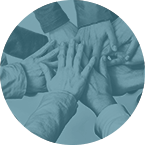I hope that you had a good social on Friday and are having a relaxing weekend.
I was looking for a video about positive emotions and how we can get them more firmly embedded into our everyday lives in school. Interestingly, whilst about to pull on my shirt yesterday morning i notice that the label in the collar was not washing instructions or the brand and size but rather a simple message, "Choose to be Happy Today." I thought what a good way to start your thinking for a day. Anyway I digress. Whilst looking for a video I received this TED talk entitled searching for Aha moments. Thinking that this might relate directly to positive emotions and that feeling of awe I decided to watch. as it turned out it didn't relate as much to positive emotions as to education and providing yet more thoughts on the directions that we are going and how we can develop academic mastery, social intelligence and creative thinking all at the same time.
This talk uses very similar ideas and language to that which we have in our mission and have been exploring over the last linking clearly to engaging and empowering as well as our culture of achievement. Matt Goldman ask big questions about why schools have allowed so many to struggle in a system that has not adapted its learning environment. He became successful in areas where school labelled him as a failure. By starting his own school he wants to make "Aha" moments happen more regularly and deliberately for students. He has developed a structure of around 8 values that he believes will create an environment in which creative thinking can occur in a safe learning environment. Here are his key drivers for making this happen. Notice how close they are to thinks that we so often talk about:
- Clear intent, purpose and assion
- Personal integrity
- direct communication and clear explanation
- Grit and perserverence
- Collaborative teams
- Embrace multiple perspectives
- Take risks and celebrate mistakes
- Speak in one voice
If you watch the video he explains this a little more.
Whilst searching for more information about Matt Goldman's Blue school, I discovered this expanding group of schools in the UK, Studio Schools, that further reflect the path that schools could be going to ensure that all students can be successful. It is a very interesting combination of academics and vocational training. An advanced form of personalized learning which is as you know a strand of the Cognita way. It is only 6 minutes long and again provides possibilities for the direction that we can move with secondary students even here in Vietnam given the contacts that we have through our parent body.
Have a good Sunday,
Yours
Adrian






